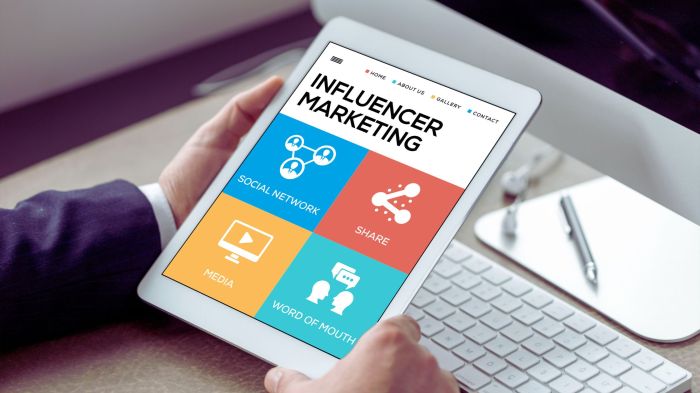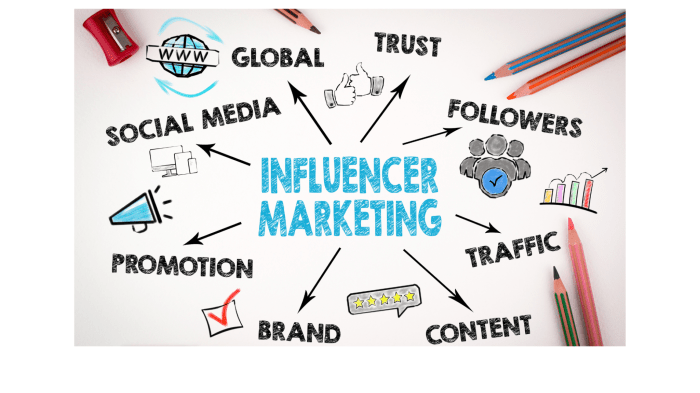Building an Influencer Marketing Campaign sets the stage for brands to connect with their audience in a meaningful way, leveraging the power of influencers to drive engagement and growth. This guide dives deep into the strategies and tactics needed to create a successful influencer marketing campaign that resonates with your target market.
Understanding Influencer Marketing
Influencer marketing is a strategy that involves collaborating with individuals who have a strong social media presence and a large following to promote a brand or product. In today’s digital landscape, where social media plays a significant role in shaping consumer behavior, influencer marketing has become a powerful tool for brands to reach their target audience in a more authentic and engaging way.
Benefits of Influencer Marketing
- Increased brand awareness: By partnering with influencers who have a dedicated following, brands can increase their visibility and reach a larger audience.
- Builds credibility and trust: Influencers are seen as experts in their niche, and their endorsement of a product or brand can help build trust and credibility among their followers.
- Higher engagement: Influencer marketing often results in higher engagement rates compared to traditional forms of advertising, as followers are more likely to trust recommendations from someone they follow and admire.
- Targeted reach: Brands can collaborate with influencers whose followers match their target demographic, allowing for more precise targeting and higher conversion rates.
Successful Influencer Marketing Campaigns, Building an Influencer Marketing Campaign
- Case Study: Daniel Wellington – The watch brand collaborated with various fashion influencers on Instagram, resulting in a significant increase in brand awareness and sales.
- Case Study: Gymshark – The fitness apparel brand worked with fitness influencers to promote their products, leading to a surge in online sales and brand loyalty.
- Case Study: SugarBearHair – The hair vitamin brand partnered with beauty influencers to create buzz around their product, leading to a viral marketing campaign and a substantial increase in sales.
Identifying the Right Influencers

Finding the perfect influencers for your brand is key to a successful influencer marketing campaign. Here’s how to make sure you’re choosing the right ones:
Alignment with Brand Values and Target Audience
When selecting influencers, it’s crucial to ensure that they align with your brand’s values and speak to your target audience. Look for influencers whose content and personal brand resonate with what your brand stands for.
Engagement Rates, Authenticity, and Relevance
Consider influencers’ engagement rates on their posts, as high engagement indicates an active and dedicated audience. Authenticity is also vital, as followers can easily spot inauthentic promotions. Lastly, relevance is key – make sure the influencer’s content is relevant to your brand and industry.
Leveraging Tools and Platforms
Utilize tools and platforms like influencer marketing platforms, social media analytics tools, and Google Trends to identify potential influencers. These resources can help you find influencers who have the right audience demographics, engagement levels, and content that aligns with your brand.
Setting Campaign Goals and Objectives
Setting clear goals and objectives is crucial for the success of an influencer marketing campaign. It helps in defining the purpose of the campaign and provides a roadmap for achieving desired outcomes.
Aligning Campaign Goals with Marketing Objectives and KPIs
When setting campaign goals, it is important to align them with the overall marketing objectives of the brand. This ensures that the influencer marketing efforts are in sync with the broader marketing strategy. Key Performance Indicators (KPIs) should also be identified to measure the success of the campaign. By setting specific and measurable goals, brands can track the performance of the campaign and make necessary adjustments to optimize results.
- Define specific goals that are in line with the brand’s marketing objectives.
- Identify relevant KPIs to track the performance of the campaign.
- Ensure that campaign goals are realistic and achievable within the set timeframe.
- Regularly monitor and analyze KPIs to measure the success of the campaign.
Crafting Engaging Content: Building An Influencer Marketing Campaign
When it comes to influencer marketing campaigns, creating engaging content is key to capturing the attention of both the influencer’s audience and the brand’s target market. Authenticity and relatability are crucial in order to establish a connection with the viewers and potential customers.
The Role of Storytelling
Storytelling plays a vital role in crafting engaging content for influencer marketing campaigns. By weaving a narrative that resonates with the audience, influencers can create a more compelling message that aligns with the brand’s values and objectives.
- Utilize personal anecdotes or experiences to create a genuine connection with the viewers.
- Incorporate emotional elements to evoke a response and build a stronger bond with the audience.
- Create a cohesive story arc that guides the audience through the content and leaves a lasting impression.
Creativity in Content Creation
Creativity is essential in capturing the audience’s attention and standing out in a sea of content. Influencers should explore innovative ideas and formats to keep their content fresh and engaging, ultimately driving brand awareness and engagement.
Experiment with different content formats such as videos, interactive posts, or behind-the-scenes footage to pique the audience’s interest.
- Collaborate with the brand to incorporate creative elements that showcase the product or service in a unique way.
- Think outside the box and push the boundaries of traditional content creation to create a memorable experience for the viewers.
- Engage with the audience by encouraging participation, feedback, and interaction to foster a sense of community around the brand.
Brand Integration Strategies
Seamlessly integrating the brand into the content is crucial for a successful influencer marketing campaign. By aligning the brand’s messaging with the influencer’s style and voice, content can feel natural and authentic, resonating with both the influencer’s audience and the brand’s target market.
- Avoid overtly promotional content and focus on creating value for the audience through informative or entertaining material.
- Highlight the brand’s unique selling points and benefits in a subtle and organic way within the content.
- Strategically place brand mentions, logos, or products throughout the content to reinforce brand awareness and recognition.
Establishing Mutually Beneficial Partnerships
Building strong and mutually beneficial partnerships with influencers is crucial for the success of any influencer marketing campaign. These partnerships can help increase brand awareness, reach a wider audience, and drive engagement with your target market.
Fostering Long-Term Relationships
- Engage with influencers beyond campaign collaborations to build trust and loyalty.
- Provide exclusive opportunities or perks to encourage ongoing collaboration.
- Regularly communicate and show appreciation for their contributions to your brand.
- Seek feedback and input from influencers to improve future campaigns.
Negotiating Contracts and Compensation
- Clearly define expectations, deliverables, and timelines in influencer contracts.
- Negotiate fair compensation based on the influencer’s reach, engagement, and industry standards.
- Consider offering performance-based incentives to motivate influencers to meet or exceed campaign goals.
- Be transparent about budget constraints and work together to find mutually beneficial solutions.
Measuring and Analyzing Campaign Performance

In order to determine the success of an influencer marketing campaign, it is crucial to measure and analyze its performance. This involves tracking various key performance indicators (KPIs) to evaluate the impact of the campaign and ensure that it aligns with the set goals and objectives.
Key Performance Indicators (KPIs)
- Reach: This KPI measures the total number of people who have been exposed to the campaign content through the influencer’s posts. It helps in assessing the campaign’s visibility and potential audience reach.
- Engagement: Engagement metrics such as likes, comments, shares, and clicks indicate how well the audience is interacting with the content. High engagement rates signify a strong connection with the target audience.
- Conversions: Tracking conversions, such as website visits, sign-ups, or purchases, reveals the campaign’s effectiveness in driving desired actions from the audience. It directly impacts the return on investment (ROI).
- ROI: Return on investment is a crucial KPI that calculates the profitability of the campaign by comparing the costs involved with the revenue generated. It helps in determining the overall success and effectiveness of the campaign.
It is essential to analyze these KPIs collectively to gain a comprehensive understanding of the campaign’s performance and make informed decisions for future strategies.
Tools and Methods for Tracking Performance
- Google Analytics: This tool provides detailed insights into website traffic, user behavior, and conversions driven by the influencer campaign. It helps in tracking and analyzing the impact of the campaign on website performance.
- Social Media Analytics: Platforms like Instagram, Facebook, and Twitter offer built-in analytics tools that provide data on post reach, engagement, and audience demographics. These insights help in evaluating the effectiveness of the influencer’s posts.
- Affiliate Tracking: Using affiliate links and codes helps in attributing conversions directly to the influencer’s promotion. Affiliate tracking platforms provide data on clicks, conversions, and revenue generated from the campaign.
By utilizing these tools and methods, marketers can accurately measure and analyze the performance of their influencer marketing campaigns, optimize strategies, and ensure maximum ROI.
